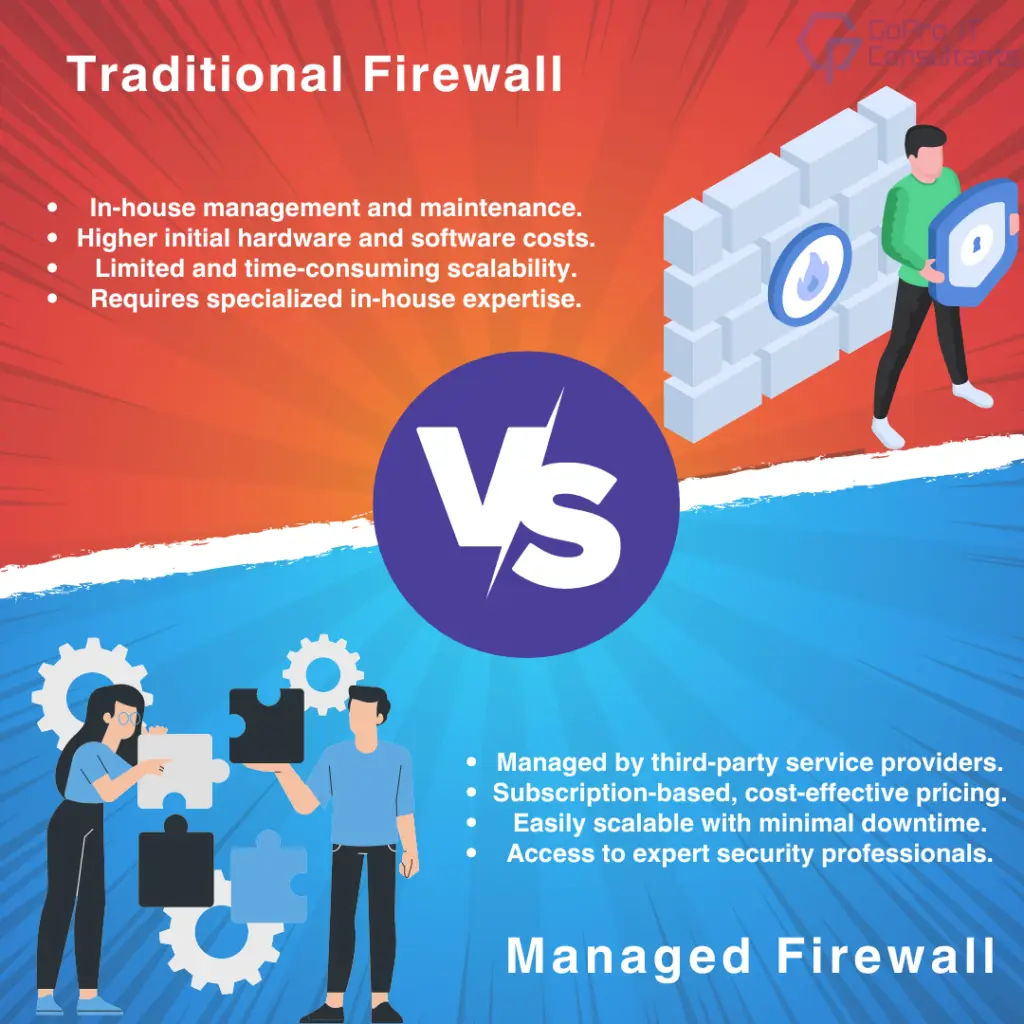
Table of Contents
- Overview of Managed Firewall Services
- Why is Cybersecurity Important for Businesses?
- What is a Managed Firewall Service?
- Benefits of Managed Firewall Services
- How Managed Firewall Services Work: Explained in Detail
- Impact on Business Operations
- Choosing the Right Managed Firewall Service Provider
- Final Thoughts
Technology is continually changing, providing incredible ease and efficiency to businesses globally. However, this advancement comes with a huge drawback: rising security worries and hazards. As firms rely more on digital activities, the threat landscape becomes more complex. In this context, managed firewall services emerge as an important solution that not only improves business security but also provides much-needed peace of mind.
Overview of Managed Firewall Services
A traditional firewall creates a boundary between your inside network and the public internet. It filters traffic coming in and out by following some preset security policies. However, maintaining such a firewall within business premises could be very complex and resource-intensive, especially for businesses with limited staff in the IT department.
Managed Firewall Services provides a powerful alternative, which outsources management and maintenance of your firewall to an IT security provider specializing in these types of services. The provider should do everything from setting up the firewall with proper configurations and rules to doing constant monitoring, detecting threats, and updating security measures.
Why is Cybersecurity Important for Businesses?
Cybersecurity breaches can mean tragedy for any business. They can lead to immense money loss, defamation, and, in some cases, legal repercussions.
Given below are key reasons why cybersecurity holds this much importance for businesses:
Protection of Sensitive Data:
Businesses have in their possession a treasure trove of sensitive data, including customer information, financial records, and intellectual property. A breach exposes the data to unauthorized persons, possibly causing identity theft, fraud, and other grave problems.
According to itgovernance, 35,900,145,035 known records breached so far in 9,478 publicly disclosed incidents this year. This shows how much data security is at stake. Whether you are a small business owner or own a large enterprise, you are not safe from cyber attacks.
Business continuity:
Cyber-attacks are poised to paralyze your IT infrastructure by causing network outages and adversely impacting business operations. This leads to huge financial loss and affects the reputation of the organization.
Regulatory compliance:
Most industries operate under very strict regulations to meet data security. Compliance with industry regulations by businesses avoids such fines and penalties.
What is a Managed Firewall Service?
Definition and Components:
Managed firewall services are usually end-to-end solutions. This includes the following :
Next-generation Firewalls(NGFWs):
NGFWs take the functionalities of ordinary firewalls a notch higher by including deep packet inspection, intrusion prevention systems, and application control.
Expert security configuration and management:
Managed Service Providers (MSPs) have a team of experts who can properly configure your firewall to fit your needs and keep it up to date by installing the latest security patches.
Constant monitoring and threat detection 24/7:
Your network traffic is under constant observance by security experts for any suspicious activities, providing the leverage for an instant response with real-time threat detection.
Incident Response and Reporting:
A Managed Service Provider(MSP) will immediately take appropriate action by providing your organization with threat-containment activities in response to a security incident and, concurrently, an incident report.
Difference Between Traditional and Managed Firewalls:
Traditional firewalls require in-house IT knowledge for setup, ongoing maintenance, and monitoring, all of which can be quite taxing for a business with very few IT resources.
Managed firewalls do not involve your staff much, easing the work at the IT department while critical things can be focused on.

Benefits of Managed Firewall Services
Managed firewall services offer several advantages over traditional firewalls, including but not limited to the following:
Advanced Security:
Designed with layered security measures, managed firewalls come equipped with special features such as advanced threat protection not found in traditional firewalls.
Proactive Threat Detection and Response:
Security experts continuously monitor your network for suspicious activity to identify and stop threats before they inflict damage.
Cost Efficiency and Resource Management:
In most cases, managed firewall services are usually cost-effective compared to the hiring and training of dedicated security personnel.
Enhanced Network Performance:
The updating and maintenance regularly will make it work better at optimum performance for the firewall, thus reducing the latency across your network.
How Managed Firewall Services Work: Explained in Detail
Typically, managed firewall services should follow this common process:
Real-time monitoring and management:
A security specialist keeps looking out for your network traffic using advanced security tools.
Incident Response and Reporting:
Where a security incident occurs, the MSP shall immediately make efforts to contain the event, conduct further investigations on the same, and furnish you with a comprehensive report.
Compliance and Regulatory Support:
This is important for all managed service providers to ensure that the configuration of their firewall meets the minimum industry requirements, regulatory standards, and compliance levels.
Impact on Business Operations
Managed firewall services affect operations in several ways:
Enhanced Network Performance:
Regular updates and maintenance help you to keep your network operational and running smoothly.
Less Downtime and Fewer Disruptions:
Proactive threat detection and response lower the probability of network outages and subsequent disruptions due to cyber attacks.
Increased Business Continuity:
Managed firewalls enable your business to run normally without hitches, even when an insecurity issue has occurred.
Choosing the Right Managed Firewall Service Provider
Selecting the Most Suitable Managed Firewall Service Provider When choosing a managed firewall service provider for your business, some of the greatest aspects that should determine the choice are:
Key Features to Consider:
Professional Security Expertise:
Look out for a provider with an innate core area of specialization in the cybersecurity domain that has seasoned security professionals. Qualifications from such staff may be assured by certifications—for instance, CISSP (Certified Information Systems Security Professional) or CompTIA Security+.
Advanced Security:
Assure the next-generation firewall by utilizing deep packet inspection, intrusion prevention systems, controls at an application level, and sandboxing to detect and prevent the newest and most advanced cyber threats.
24/7 monitoring and support:
Choose a provider that provides 24/7 monitoring and support for guaranteed network safety even during off-hours. Look for these kinds of providers: SIEM solutions for centralized log collection and analysis.
Scalability and flexibility:
As time goes by, your business’s security requirements may evolve. Opt for a solution provider that gives scalable solutions: those with flexibility in adaptation to changing security requirements.
Regulatory Compliance Support:
If your industry has specific data security regulations, such as HIPAA or PCI DSS, ensure that your vendor can assist you in configuring a firewall to meet those requirements.
Reporting and Transparency:
It is key in maintaining visibility into your network health through regular reporting of security incidents and firewall activities. Detailed reports should be conducted by service providers, and threats communicated clearly.
Questions to Ask Prospective Suppliers:
- Please explain to me which firewall technologies and features you have.
- How do you handle security incidents and what is your response time?
- Does your company have compliance support services for single regulations?
- How do you make sure your infrastructure is secure?
- What is your pricing model and what services do you provide?
- You likely have some references or best practice case studies with successful client implementations.
Case Studies and Success Stories:
Managed firewall providers in good standing will often post success stories and case studies of their clients on the company’s website. Testimonials such as these provide a panoramic view of the experience of the provider and the benefits they deliver to their clientele. You can look at these to weigh the level of effectiveness and fit for your particular needs.
What is Gained from Managed Firewall Services:
You can have countless benefits by implementing managed firewall services—for instance:
- Enhanced security posture with advanced threat protection feature.
- This peace of mind that your network is under surveillance continuously by security professionals.
- Made IT burden lesser by outsourcing firewall maintenance and management.
- Improved efficiency in operations by minimizing downtime and disruptions.
- Enhanced compliance with industry regulations and data protection standards.
Final Thoughts
In the age of continuous cyber threats, managed firewall services act as the strong front line of defense for businesses. To outsource the intricacies of managing firewalls to experts is something that will go a long way in helping any organization increase its security posture and minimize risks that will endanger critical assets.
Remember that strong security does not rely on a single feature. Managed firewalls are imperative but must be included as one of many layers in the defense-in-depth strategy: training of staff, regular audits, and incident response planning. With those measures, investment by businesses can build a security framework resilient enough to handle all changes occurring within the threat landscape.
The decision to implement managed firewall services is essentially strategic: it’s about the priorities of ensuring data protection, business continuity, and trustworthiness for customers. Only the most reputable managed service providers enable organizations to leverage the full potential of their network infrastructure and surf the electronic world with confidence.
